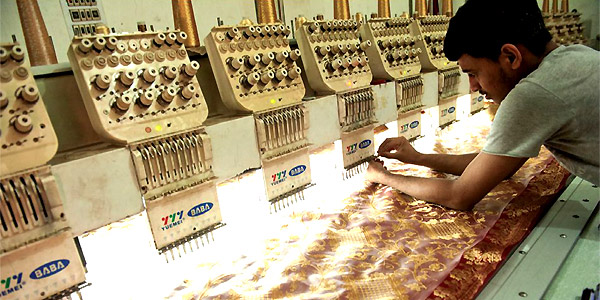Diploma In Handloom Technology
The handloom sector in India is showing a steady progress and the Government of India is also introducing some new plans to further enhance the efficiency, productivity and production of the handloom sector thereby improving the socio-economic status of the handloom weavers.
The government is also taking every steps to upgrade the skills of the handloom weavers and is also offering them with marketing and infrastructural input support.
Diploma in Handloom Technology is designed to cater technical personnel to the handloom and textile industry. It deals with the study of fibers, fabric structure and cloth analysis, weaving theory and fabric calculations, textile chemistry with dyeing and printing, computer aided textile designing, computer colour matching, textile testing and quality control, marketing management etc.,
Nature of Job
Working conditions are generally good in the textile industry. Newer mills have temperature and humidity controls, while older mills may have inadequate lighting and poor ventilation. Most employees work with machinery, which is often noisy, but the accident rate is fairly low in the textile industry. Most textile mills have around-the-clock operations and run three shifts. The work is generally steady in the textile industry. When production slowdowns occur, most mills shut down for one or two days a week instead of laying off workers.
Syllabus
Weaving Theory & Textile Calculation-I, Weaving Practice,General Textile Technology , Fabric Structure & Cloth Analysis-I, Textile Design & Colour-I, Chemistry Theory.
Chemistry Practice, Physics, Machine Drawing, English,Weaving Theory & Textile Calculation-II, Weaving Practice, Fabric Structure & Cloth Analysis-II, Textile Design & Colour-II, Textile Chemistry Theory-I, Textile Chemistry Practice,Material Science & Engineering, Computer Application and Information Technology,Pollution Control in Textile Industry,Weaving Theory & Textile Calculation-III,Weaving Practice,Fabric Structure & Cloth Analysis-III.
Computer Aided Textile Designing and Computer Colour Matching,Textile Chemistry Theory-II, Textile Chemistry Practice, Textile Testing Theory & Quality Control, Textile Testing Practice, Marketing Management,Project Work.
Stipend
Each candidate admitted into the course will get stipend of Rs. 200/- per month in the first year, Rs. 225/- per month in the second year and Rs. 250/- per month in the third year of the course by the central government and an equal amount of stipend i.e. Rs. 200/- p.m. in the first year, Rs. 225/- p.m. in the second year and Rs. 250/- p.m. in the third year will also be paid by the government of tamil nadu during the course.
Eligibility & Admission
Candidates who have passed SSC / SSLC examination with 45% marks in aggregate and minimum 50% marks in mathematics and sciences put together with English as a subject of study are eligible for admission. In the case criteria for SC/ST candidates relaxation of 5% marks in aggregate and minimum 45% marks in mathematics and science put together.
Admissions to reserved category seats will be governed by reservation policy/rules of respective state governments. The Development Commissioner for Handlooms, New Delhi has earmarked the quota of minimum 20% of seats for the weavers community.
Higher Studies
Post Diploma in Textile Chemistry (PDTC),(1 ½ yrs).
At the request of industry / Directorate of Handloom & Textile of different states / textile institute job oriented training courses for further specialized courses are also conducted depending on their specific requirement etc., during vacation period of two months (May / June). The syllabus and course details are tailor made according to the specific need and requirements.
Workshops Organised by IIHT
- Refresher course for Art Designer.
- Training for officials of Department of Handlooms & Textile of state Govt of Tamilnadu & Kerala.
- PRODIP project of KVIC.
- TRAINING WEAVERS UNDER DDHPY scheme.
Special Capsule Course as per the request of the industry
Job prospects
The best way to get started in a production job in the textile industry is by applying directly to textile mills.
Production workers in the textile industry can advance by becoming supervisors of other workers. Some become instructors who teach new workers to run machinery. Others become technicians. Most companies have training programs for workers who want to move into more skilled jobs. Sometimes textile companies pay part or all of the tuition for job-related courses.
Textile technicians can also move into jobs as supervisors or instructors. With further education, they can become managers or engineers. Managers and engineers sometimes advance into high-level executive positions in the textile industry.
Employers
National Handloom Development Corporation Limited(NHDC).
The government is also taking every steps to upgrade the skills of the handloom weavers and is also offering them with marketing and infrastructural input support.
As far as this sector is concerned, the only government organization in India is National Handloom Development Corporation of India. However, this government organization has offices at different states of India like Kerala, Gujarat, Chhattisgarh, Tamil Nadu, Andhra Pradesh, Karnataka and other states as well and personnel are required in all these branches of the organization.
Different job positions available in Government handloom sector:
Recently the National Handloom Development Corporation of India called for applications from candidates for the following positions:
- Superintendent.
- Deputy manager.
- Senior manager.
- Chief manager.
- Junior Assistant.
- Assistant Manager.
 Courses and Colleges after 10th After 10th, What Next?
Courses and Colleges after 10th After 10th, What Next?








